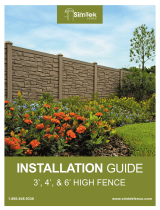
15
1. Getting Started
• Be sure to call underground (811) prior to digging
• Determine gate location(s)
• Stake out the fence line
• Space and mark post hole locations for gate and
sections (spacer bar/template may be useful)
• Start at an end, gate, or corner post and work
outward to determine proper fence height relative
to ground. If there is a slope it is easier to begin at
the top end and work your way downhill
2. Dig Holes
• Dig holes 48" deep
- Hole size for 5 x 5 posts = approximately 12"
• Bell the bottom of holes
• Clean holes and check for straight panels
3. Install Panel Brackets (note brackets come
attached to the tip of fence posts)
• Determine height of bracket from top of post
• Attach bracket to post with #14 hex washer head
self-tapping screw
• A template can speed attachment for level
installations
4. Cutting Down Posts (if required)
• Measure height from top of post
• Cut off bottom of post with metal cutting blade
• Never cut the top of the post
5. Setting Posts
• Insert post and hole
• Determine rough height
• Fill hole around post with concrete mix (sand,
gravel and cement) approximately 2" or 4" below
grade
• Tamp concrete in hole to eliminate air pockets
• Level and square post
6. Spacing Posts
• Use steel stiffener from panel (95" – 8')
• Place stiffener between posts
• Set post (leave spacer in place for
one hour minimum)
• Set 3 to 4 posts with stiffeners as spacers, then
advance them one at a time starting with the first
stiffener
7. Install Bottom Fence Panels
• Check to ensure top and bottom rails have
stiffeners. They come installed, however may have
been removed to use as spacers when setting
posts
• Lift panel and insert into post channels
• Ease panel down onto panel brackets
• Level panel
NOTE: Be certain that the 2" high rail is on top of the
bottom panel
8. Install Top Panel
• Lift panel and insert into post channels
• Ease panel down onto bottom panel
NOTE: Be certain the 2" high rail is on the
bottom of the top panel
Tip: When installing panels, insert a short piece of
1-3/8" pipe into both ends of the panel to use as
handles. 2x6 wood blocks can be used to support
panel while lowering.
9. Secure Fence Panels
• Panels must be attached to end and gate post
with one fastener per panel
• To prevent unauthorized panel removal, you can
attach one end of each panel into the post with
one fastener
• Never attach both ends of a panel to posts
10. Cutting Panels (if required)
• Remove steel stiffeners from panel
• Determine distance between posts from inside of
channel to inside of channel
• Cut stiffeners 1/4" shorter to allow for cut panel bracket
• Measure and mark panel 1/4" shorter than
distance between posts from inside of channel to
inside of channel (this is needed for expansion
and contraction of panel)
• Cut panel
• A cut panel bracket is required on top and
bottom cut panels.
Tip: Pinning the cut panel bracket in place will help with
installation (#12 x 1" pan head screw is recommended)
11. Gate Openings
• Post spacing is critical. The ideal spacing is 1" on
latch post and 1-1/2" between hinge post
• Hinges should be attached to a gate post
12. Gate Installation
• First, attach striker bar to gate using provide
button head screws
• Thread the ½" hinge rod into the upper and
lower inserts in the metal gate frame leaving
approximately 1-1/2" from the edge of the gate
to the bracket.
• Determine proper height for gate and block up
gate square with fence
• Attach hinges to gate post with 2-1/2" self-tap-
ping screws provided (do not over tighten screws
as this can crush the internal foam and make an
indentation in the post
• Level the gate
• Align the latch with the striker bar and attach the latch
to end post with 2-1/2" self-tapping screws provided.
13. Install Caps
• Install post caps (caps are pressure fit, however a
3" stainless steel deck screw can be driven
through the top of the cap into the middle of the
post if desired)
Installing 8' Ashland Fence

























